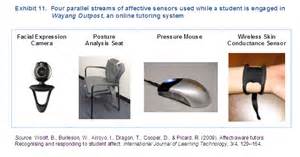by
Christel Swasey February 10, 2016
Buried deep in a 2012
report
on “Educational Data Mining and Learning Analytics,” the US Department
of Education states that one of the key applications of educational data
mining is
“user profiling” (page 25).
The paragraph
says: “These application areas are (1) modeling of user knowledge, user behavior, and user experience; (2)
user profiling; (3) modeling of key concepts in a domain and modeling a domain’s knowledge components, (4) and trend analysis.”
Later on, in
Exhibit 1, we see a flow chart. It shows “
student learning data” flowing into the
“predictive model,” the “
intervention engine” and then into the
“adaptation engine.” Clearly, the goal is government-directed behavior modification following student psychological profiling.
This is sad, because “users” now include even babies, since the
Department of Education has successfully pushed ESSA into law, with its
“early childhood education” programs that are included in the citizen
data mining venture.
The Educational Data Mining
report
of 2012 is not the only such report from the U.S. Department
of Education. Related is its 2013 report, “Promoting Grit, Tenacity and
Perseverance” which contained more of the same psychological data
gathering goals.
The “Promoting Grit” report included pictures of biometric sensory
devices: pressure mouse sensors, posture analysis seats, facial
expression cameras, and wireless skin conductance sensors, which would
mine student psychological elements, including “grit,” “tenacity,”
“perseverance” and more.

In
SETRA (the Strengthening Education Through Research Act,
currently in the US House of Representatives,
having somehow passed the Senate) we find that the federal research
programs will be strengthened and enlarged so that more data, including
“social and emotional learning” will be gathered for federal use.
Philosophical and constitutional questions need to be hotly
debated by the House of Representatives. More importantly, these need
discussion at the dinner table, by moms and dads and teachers and
principals and school board members:
- Will American children grow up free– as self-governing, free agents,
with intellectual and moral privacy and the accompanying power to soar
outside any box, as well as the power to fail? How, if even their
thoughts and beliefs are monitored and subjected to “intervention”?
- Do Americans want students to be profiled, centrally managed, and
nudged in a predetermined, government-and-workforce approved direction
–constantly monitored and told what to do? If so, what qualifies
central planners to trump individuals’ and families’ desires?
- Does widespread societal faith in “experts” relegate personal
privacy and real autonomy to historical artifact? Should personal data
be studied and behavior “intervened” by unsupervised central planners?
Will this really keep us “safe,” as cogs in a centrally managed,
economy-focused collective? Do we want to be a government-branded herd,
or free, individual, human beings?
Here come the practical questions for how all this profiling may pan out.
- If we allow government to keep psychological profiles (not just on students– since the P-20 Workforce Pipeline
means preschool through workforce citizens get tagged) –then, what
happens if a thirty year-old wants to buy a gun, and his background
check comes back negatively because when he was in 5th grade, his data
was interpreted to mean future depressed individual? And what if his
5th grade data was incorrect?
- What if “at-risk academically” is redefined and applied to a student for attending a private, religious, or home school?
- What if “mentally unstable” is applied to anyone who does not agree with what is being taught in school?
- What if “socially deviant” is applied to anyone who disagrees, or is
bored with, collectivist groupthink and group work? –The “what if”
list could be endless.
We don’t want to see any “what if”s come to pass. We can put proper
protections in place. Legislators, write bills and voters, actively
push to get them passed –laws that will deny researchers, school systems
and governments access to psychologically profiling, via tests,
curricula, and standards without
informed, written consent.
The fact that “profiling’s already here” is
no excuse. We can begin where we are, and take a stand today. It
is
true that our students are already being psychologically profiled, to
some degree, by the government and schools, already: look at the
math standard for Common Core that requires a student to be tagged for presence or absence of
“perseverance”. That’s not about math; that’s about psychology and character.
The
perseverance tag and others like it will certainly be on the SAGE (Common Core,
CEDS aligned) tests; notably in Utah and Florida, which use tests created and scored by the
behavioral research company AIR (American Institutes for Research).
For additional evidence of current psychological profiling, look at Utah’s “
Student Strengths Inventory,” which gathers nonacademic data on high schoolers.
But none of that is any excuse.
If rain is leaking through a hole in the kitchen, that does not mean
we can innocently stand by while someone pokes holes in our living room
roof and the bedroom ceiling, and makes plans for the removal of the
roof.
The Father of the Constitution, James Madison, said that if men were
angels, no government would be necessary. To that I add, if governments
and corporations were angels, no privacy protections would be
necessary; student data would be consensually collected, analyzed, and
used to bless the lives and enlarge the opportunities of every student.
But men, governments, and corporations are not angels. That’s why We,
the People, need to stop invasive bills like federal
SETRA; it’s why we need to write and pass good, protective laws locally.
Take action today.
Write a letter. Make a phone call. Meet with a legislator. Pray with
great faith; miracles of knowledge and understanding and miracles within
political workings are needed, to awaken an asleep populace and to
build up protections for our children’s minds, hearts, and freedoms.
https://whatiscommoncore.wordpress.com/2016/02/10/user-profiling-by-department-of-ed-stopsetra/
